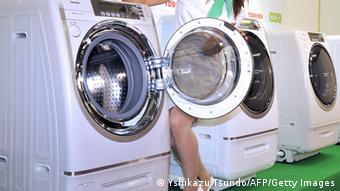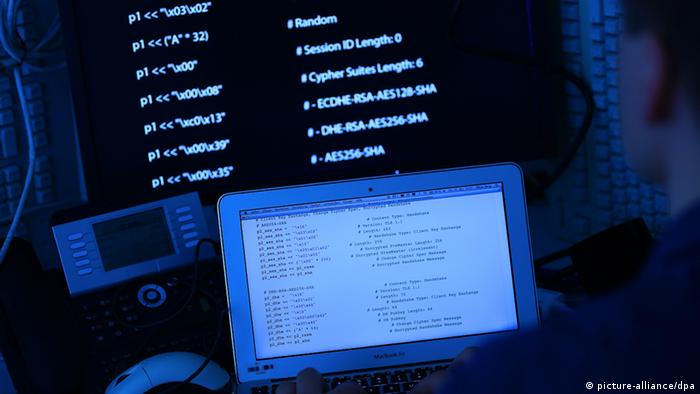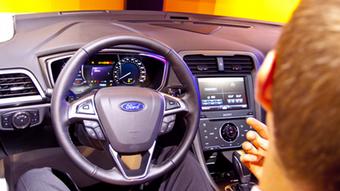CYBER SECURITY
When networks turn deadly
Researchers have shown that hackers can use computer viruses to crash cars. In a world where a growing number of devices are connected via the Internet, there could be a growing danger of such attacks.
Interconnected modern devices have made our lives easier: Navigation systems in cars and on smart phones help us find the shortest route to our destination; we're able to communicate nonstop; access to information is fast and easy. Technophiles already switch their home heating on or off from work via the Internet, or order a pizza through their television.
But wherever such devices can be externally accessed, they can be attacked - by benevolent or malevolent hackers, terrorists, or governments.
The goal of most attacks is to crash computer systems or to retrieve data, such as passwords. Large agencies such as the FBI and the United States Secretary of Defense have been targeted in the past.
The attackers find and exploit holes in security systems. This principle works on all devices that communicate externally, not just traditional personal computers - but also planes, ships, cars, and household devices. The German documentary "In the hackers' sights" depicts just how vulnerable many systems really are.
Remote-control manipulation
This film opens with the death of US reporter Michael Hastings. The journalist was killed in a car accident, which many believe was deliberate. In the film, Richard Clarke - a Secret Service expert and a former White House consultant - said it is quite plausible that Hastings' car was hacked.
The documentary goes on to show a hacker and a university professor demonstrating how: they control a car from a laptop, manipulating its brakes and bringing it to an abrupt halt.
Attackers get access to the car computer through a virus. If the car has an Internet connection, the virus can be hidden in a music file or game that the driver downloads via the in-vehicle computer.
"The networks that cars use are often outdated in terms of technology," said hacker Chris Valasek: "For a long time, there was no protection on communication or for encryption."
Fellow hacker Hugo Teso shows how malware can be used to forced even planes to detour. Such attacks exploit loopholes in airline communication networks for plane maintenance or for contacting the flight crew, he explained.
No less disturbing are scenarios that target infrastructure, such as electricity grids. The possibility of a cyber attack has given energy companies a headache for some time. Many companies protect themselves by largely disconnecting important computer systems from the Internet.

Washing machines connected to the Internet could run their loads at off-peak hours, benefitting the electrical grid overall
But cyber attackers will often still find a way in - through intelligent electricity meters, for example, as news agency Reuters reported recently. Clients and suppliers are directly connected through such meters, which exchange consumption and usage data via the Internet.
Manufacturers have to catch up
There is a growing tendency toward all-around interconnectedness in a so-called Internet of Things. The number of connected household devices is set to rise - in the "smart home" of the future, washing machines, televisions, lamps and ovens can be remote-controlled from smart phones or tablets. That makes them vulnerable - someone could, for example, switch on an oven when nobody is home.
But there's no reason to panic, said IT security expert Christof Paar of Bochum's Ruhr University, adding that the established use of electronic garage doors shows not every opportunity invites thieves. There have been hardly any cases of burglary in which an electronic garage door was exploited, Paar told DW in an interview.
It's a question of cost versus income, Paar explained: "Intruders don't really benefit from hacking household devices - it's different from hacking online bank accounts." But he does think that manufacturers still have a lot of catching up to do.
"Security functions built into devices are often nonexistent, very rudimentary or weak," Paar said, adding that manufacturers of household devices, kitchens or shutters simply lack experience when it came to data security.
What's possible will be done
Documentary co-creator Klaus Scherer's research made him realize that many manufacturers avoid discussing the topic "because they're trying to sell planes, cars, et cetera."
"They are strong advocates of interconnectedness and advertise a 'modern new generation of vehicles that are capable of anything,'" he told DW, adding that they're not keen to trigger public debate about the risks - not least because competition pressures are high.
Scherer noticed that German consumers for one have lost trust in such technology in light of the (link) NSA spying scandal. And yet, that will probably not make much of a difference on the global market, as for example US consumers' attitude to the technology is entirely different.
In the US, Scherer said, the question is not how to protect oneself from the surveillance state as it is in Germany, but rather: "What can be possible?" And what's possible is then done. dw de




No comments:
Post a Comment